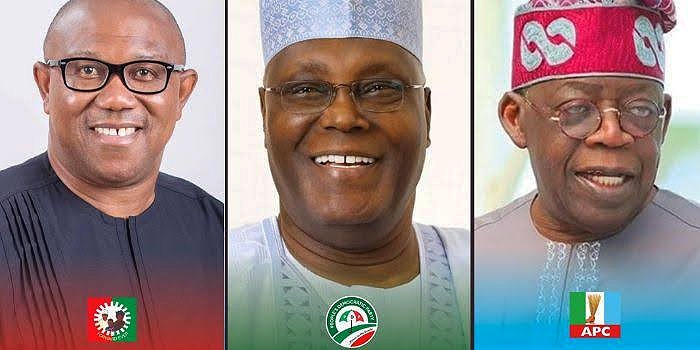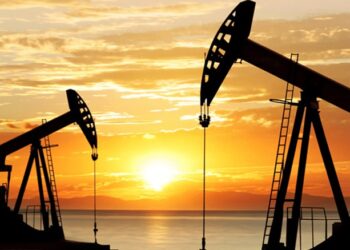By John Ikani
18 candidates are in the race for Nigeria’s Presidency. However, only three out of the ‘multitude’ are considered frontline contenders for the nation’s top job. Heritage Times [HT] analyses how the top 3 contenders currently stand, their strengths and weaknesses.
The analysis – not beau ideal – aims to set the stage for a more rigorous interrogation of the trio’s particulars and perhaps, help Nigerians find amongst them, the candidate best suited for the nation’s top job.
1. Peter Obi
Peter Obi, the Presidential flagbearer of the Labour Party (LP) is a long-shot candidate who has unexpectedly taken the lead in the race to become president of Africa’s most populous country.
The 61-year-old businessman and politician from Nigeria’s South Eastern Anambra State, has been energising young, urban voters across the country’s main divisions of religion, geography and ethnicity.
Dubbed “the man who carries his suitcase,” The Economist of London says the “sudden ascent” of Peter Obi represents a “rare chance” for Nigeria.
Mr Obi canvasses for an election that is based on competence, character and promises to upset the old electoral calculus, which was based on horse-trading to form majorities between politicians who gathered votes mainly among their coreligionists or ethnic groups.
Interestingly, a Bloomberg opinion poll favours Obi, to win the 2023 presidential election. This is following the ANAP/NOI and We2geda poll result released recently which put Obi at 21% and 51% respectively ahead of other competitors.
Strengths
As an energetic 61-year-old, Mr Obi stands in sharp contrast to the two other top contenders. They are 75-year-old Atiku Abubakar and 70-year-old Bola Tinubu.
Mr Obi is no political outsider, having served two terms as governor of Anambra state until 2014. He then stood as Mr Abubakar’s vice-presidential candidate in 2019.
He has a vigorous social-media operation with a vast, passionate following, and is strikingly open to interviews.
Mr Obi knows the issues and almost has the solutions off the top of his head. The LP flagbearer has a solid network of friends both in the private and public sectors and he is very rich too, even though he embraces a spartan lifestyle.
Weaknesses
Despite Obi’s popularity, analysts say it may be challenging for the LP flagbearer to win more than 25% in each of at least two-thirds of the country’s 36 states (plus the capital) to avoid a run-off. His opponents suggest he does not have a proper “structure.”
Activists have also raised concerns that Obi might suffer outright rigging by the ruling All Progressives Congress (APC) which will try to depress turnout in areas where he is strong.
2. Atiku Abubakar
Atiku Abubakar from north-eastern Adamawa State woos Nigerians with a reminder of the good times.
The 75-year-old is an affable and enterprising figure who moves adroitly between the worlds of commerce and politics – qualities that his supporters say will help him unite the country and revive the economy.
In other words, the Peoples Democratic Party (PDP) flagbearer appeals to voters – most especially those of northern extraction – who want a revival of the economy and national unity, after witnessing how the incumbent President Buhari institutionalized nepotism and oversaw a period of economic regression.
Strengths
Mr Atiku has been involved in Nigerian elections for decades and is no stranger to the two dominant parties. He is a founding member of the PDP and once vied for Presidency under the APC.
The Turaki of Adamawa is campaigning on his success as Nigeria’s vice-president between 1999 and 2007, during which as head of the government’s economic team he oversaw successful reforms in the telecommunications, pensions and banking sectors that led to jobs and GDP growth.
Weaknesses
Atiku’s emergence as the Presidential candidate of the PDP has not been well received by some influential southern governors who insist it is the turn of the south to produce Nigeria’s next president after eight years of President Muhammadu Buhari, a northerner like him.
His choice of a running mate has also stirred an open rebellion within the party, with many believing that the snub of the highly influential Governor of Rivers state, Nyesom Wike, might prove costly.
The 75-year-old may also face the challenge of convincing young Nigerians that he is a suitable choice, given his age, and that he is an offshoot from the political class many have lost confidence in.
3. Bola Tinubu
70-year-old Bola Tinubu with questionable paternity and state of origin, is widely credited with reshaping Nigeria’s commercial hub Lagos.
A ‘godfather’ with sights on conquering Nigeria, Mr Tinubu in many ways feels entitled to Nigeria’s presidency, including for playing a role in Buhari’s ascendancy to the position of President.
Known as “Jagaban” by supporters, the former Lagos State Governor is one of the biggest names in the nation’s political lexicon today.
His rise from a relatively unknown Bola in 1999 to becoming the national leader of the ruling APC and eventually Presidential candidate continues to mystify many.
Strength
Heavily connected and boasting of a huge war chest that could actualize any cause, Tinubu is a political samurai, underestimated only at the peril of his opponents.
Weaknesses
At 70, Tinubu’s real age has been a subject of controversy, with many stressing that he is far past the age group of septuagenarians.
His health challenges and poor mental alertness are no secret to many who don’t fancy having a sick president at the helm of affairs of a sick nation.
Unlike the 2 other billionaire contenders, Tinubu’s wealth is questionable, a development which emboldens the consensus that he is corrupt.
The Buhari albatross hangs on Tinubu’s neck. He and a clique within the APC brought Buhari to power in 2015. Many believe that Buhari’s failure to deliver on his campaign promises doesn’t speak well of Tinubu who held the position of National Leader of the ruling APC since 2015.
Also, Tinubu’s decision to run a Muslim-Muslim ticket doesn’t sit well with many Nigerians including members of the ruling APC.



































